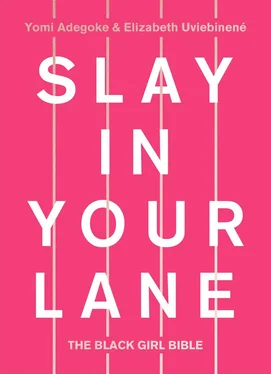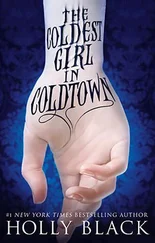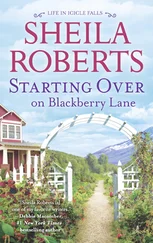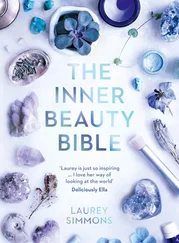I also remember thinking that there was often a double standard between the black girls and white girls in school. We were punished when they would be given second chances. Alarmingly, this is borne out in a study published in 2017 by Georgetown Law Center on Poverty and Inequality. It revealed that, starting as young as age five, young black girls are viewed by adults as being less innocent and more adult-like than white girls.
Heidi Mirza elaborates: ‘If you just step out of line a little bit, if you’re white and you laugh in the class they might laugh with you; it’s kind of a joke. If you laugh, it’s like, you’re laughing at somebody, get up and go out of the room. So what they found was that there is a kind of stereotype of blacks being more aggressive, and it’s like you said, this subconscious bias goes on, so any little thing is escalated much quicker.’
Dawn Butler explains how perceptions of teachers left her at odds aged 12: ‘There was a girl, a white girl, called Andrea in my school, and she would always get As, no matter what she did she would always get As, so I decided I was going to buckle down and get an A. It was a history assignment and so I worked really hard on this history homework. It was a really good piece of work, and I remember going into school and I was really chuffed, and I brought it in, and then I got a D for it. And I compared it to Andrea’s work, and we both compared it because we were actually in competition to see who could write the neatest and the smallest.
The teacher said that I had cheated. There was no way I could prove that I didn’t cheat, that it was my bit of work and that I worked really hard at it. And I just thought, “things are never going to change” – I even had this discussion with Andrea. We decided one day we were going to swap work, because we knew that no matter what I put in I was never going to get an A and whatever she put in she was always going to get an A. Looking back I was so frustrated that I couldn’t do anything to change this, but it was the first time, I suppose, that I realised that once somebody has an impression of you, it’s very difficult for them to change that impression. So, you know, Andrea the white girl was always going to get an A, Dawn the black girl was never going to get an A. It was a hard thing to accept – I kind of didn’t want to try my best anymore because it was just never going to be rewarded.’
Being an opinionated confident black girl was a no-no in my school, and as Jamelia, singer and TV presenter explains, her daughter’s experience sounds similar: ‘I’ve noticed it in their school, being in a private-school environment, they’re still the minorities there, and I’m being called in and I’ve had a meeting where they’ve said, Oh, you know, she’s just acting too confident. Yesterday, my eldest, she tested out a sociology class, because she wants to do it for A-level – she’s finishing her GCSEs but they get a taster class – and the teacher said he showed her a statistic, a table, and at the bottom, it showed ethnicity and their success in exams, and he said black boys and black girls were at the bottom of the table. My daughter was like, I don’t even know how he thinks that might have made me feel, and it shows that he just didn’t even think, but, what I said to her is that at least he had a statistic. What he then went on to say was that the reason black boys are at the bottom is because they don’t have father figures and my daughter called him out, and she got in trouble.’
There’s evidence to suggest that if your teacher looks like you, you might do better in school. An American study revealed that when black students have black teachers, those students are more likely to graduate high school. ‘The study found that when students had teachers of the same race as them, they reported feeling more cared for, more interested in their schoolwork and more confident in their teachers’ abilities to communicate with them. These students also reported putting forth more effort in school and having higher college aspirations. When students had teachers who didn’t look like them, the study found, they reported lower levels of these feelings and attitudes. These trends were most visible in black students, especially black girls.’ 6So it is particularly frustrating that in the UK, we don’t have enough black teachers. According to the National College for Teaching and Leadership, only 12 per cent of trainee teachers in 2013–14 were from minority ethnic groups – a statistic that has not really changed in five years. 7The lack of black teachers across the country means that there could be a lack of understanding as to how to motivate and work with black children. In 2007, Catherine Rothon argued that a lack of co-ethnic role models may explain poor performance from Black Caribbean boys, 8and those teachers who do come from ethnic minorities report difficulties that include casual racism, lack of role models for black and minority ethnic (BAME) children, and being forced to deal with microaggressions from other staff. I go into more detail about the impact of casual racism in the ‘Water Cooler Microaggressions’ chapter. 9
.....................................................
When I grow up …
.....................................................
What did you want to be when you grew up? Who were your role models? We can all remember what it felt like to be full of hopes, dreams and ambitions about what jobs we were going to have when we were old enough. But as the years passed, society – and school – often shut down those ambitions and set limitations before we had time to really know what it was we wanted to do. According to a BBC Newsround ’s study, about one in five black children believe their skin colour could damage their job prospects. One child told Newsround ’s reporter, ‘This generation is still being judged and stereotyped, so it’s going to be difficult for us to do what we want to do when we’re older.’ 10
For black women, this is exacerbated by the fact that we tend only to be shown a narrow range of possibilities for ourselves, and are bombarded with the idea that there are only certain roles for certain people. Heidi understands this all too well from her research: ‘There is so little representation of you, as a young black girl, in school, so you don’t see your image in a positive way in the textbooks, in the history. A student of mine, she did her PhD on black history, and she said that when she interviewed black kids, boys and girls, and their parents, they said, “We don’t want black history to be taught in schools because it’s always about slavery and the enslaved, and then we get teased.” She said it’s the way that it’s taught that is the problem. Not that it’s taught as part of the horrors of the colonial and imperial system, no. Or how it fuelled the industrial revolution, no. It’s taught as a separate thing, which is degrading, and so the only images that you do see are in chains, being lynched or something, and you’ll never see positive images.’
One of the things we hope to achieve with Slay In Your Lane is to show young black girls that there is no limit to the roles they can carve for themselves in the world.
Malorie Blackman OBE is an award-winning children’s author who held the position of Children’s Laureate from 2013 to 2015. She believes it’s incredibly important for black children to have these visible role models. ‘When I was a child, even though I loved reading and I loved writing, it didn’t occur to me that I could be a writer because I’d never seen any black writers, and in fact, the first time I read a book by a black author was The Color Purple, and that was when I was 21 or 22. Now, that’s a ridiculous age to get to before you actually read about black characters written by a black author, and it was only reading that that led me to the black bookshop in Islington, when it was there, and that’s where all my money went. I remember in one lesson, I said to my teacher, “How come you never talk about black achievers, and scientists, and inventors?” And she looked at me smugly and said, “’Cos there aren’t any.” And, I didn’t know any better, I had never been taught about them, so I felt there was a huge gap in my knowledge about my own history: never been taught it, never come across any books about my own history, so when I found a black bookshop, it was non-fiction books, it was mostly African-American writers, but I devoured them.’
Читать дальше












